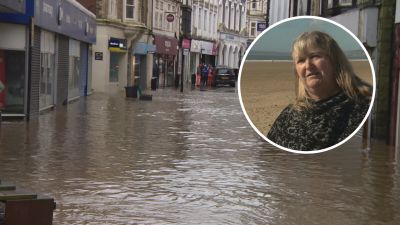Welsh Government to spend £200 million to tackle flooding and coastal erosion

The Welsh Government says it will spend more than two hundred million pounds on tackling flooding and problems caused by coastal erosion over the next three years.
The £214m investment includes spending as part of the deal where Labour and Plaid agreed to work together on certain policy areas.
Political opponents have welcome the news but say it should have come sooner.
The package includes an increase of £24m over the next years which will boost the budget of the agency, Natural Resources Wales, which has flood defences amongst its responsibilities as well as offering specific funding for local authorities to apply for.
Announcing the money, the Climate Change Minister, Julie James, described it as the Welsh Government’s “largest ever flood programme totalling over £71 million next year and £214m over the next three years.”
“This will be used to deliver major flood schemes, identify local needs and develop future projects. Our funding will also help improved forward planning – we look forward to working with Risk Management Authorities to accelerate delivery and support for the people of Wales.”
Speaking for Plaid Cymru which is jointly responsible with Labour for parts of this announcement, Sian Gwenllian MS said, “Climate change means our communities are at increased risk of flooding.
“This funding will make an important difference – helping our efforts to protect homes and businesses across the country.”
Wales’ crumbling coastline: The homes in danger of slipping away
Flooding is Wales' biggest threat from climate change, scientist warns
Storm Franklin: Powys residents rescued by boat as homes evacuated amid flooding
The policy has come out of the unusual agreement between Labour and Plaid Cymru to deliver certain aspects of the Welsh Government together.
Speaking to ITV Wales, the Labour Climate Change minister denied that her party had been forced into action by their partners in the agreement.
“That's absolutely not the case. This programme was put in place in 2014. They take a long time to come to completion. They're incredibly complex engineering schemes. There are a number of them that I've already visited around Wales, and will be accelerating the programme into the future.”
The announcement was given a cautious welcome by the Welsh Conservatives whose Shadow Climate Change minister, Janet Finch-Saunders, said “Whilst it is encouraging to see Labour ministers finally start to address the real risk that flooding poses, so much more needs to be done and we need to see more innovative policies being put forward.”
“I fear this new money for Natural Resources Wales will not go far enough to address the increase in responsibilities that the organisation currently has. What Wales needs is an integrated response to flooding through a National Flood Agency in order to work with local communities to coordinate flood risk management, responses to flooding and carry out independent inquiries into flooding events.”
Barry Griffiths, a flood warden and community councillor in Kimmel Bay near Rhyl believes the funding announced today does not go far enough.
Mr Griffiths told ITV Wales: “It’s a step in the right direction, but it is vague in the way it says this is a step change. The whole of climate change is something we haven’t done before.
“We here in Kimmel Bay have a Coastal Risk Management Programme, a £14 million project. Of that, 85% is covered by the Welsh Government, but that only takes us to a standard that meets historic flood risk and does not meet the threats posed by climate change.
“We are seeing the increased frequency and magnitude of weather events.
“The flood risk here is dependent on weather Issues. When we have a high tide that combines with strong offshore winds and low atmospheric pressure we are really at risk.A fourth element is increased rainfall that runs into the River Clwyd and puts unprecedented pressure on the infrastructure here.
“We are still basing our flood risk on a historic model. I am pleased to see this, but it is by no means a solution to the problem.”
“For people unaffected by flooding, this is news, for those communities that have been flooding, the consequences are devastating.”